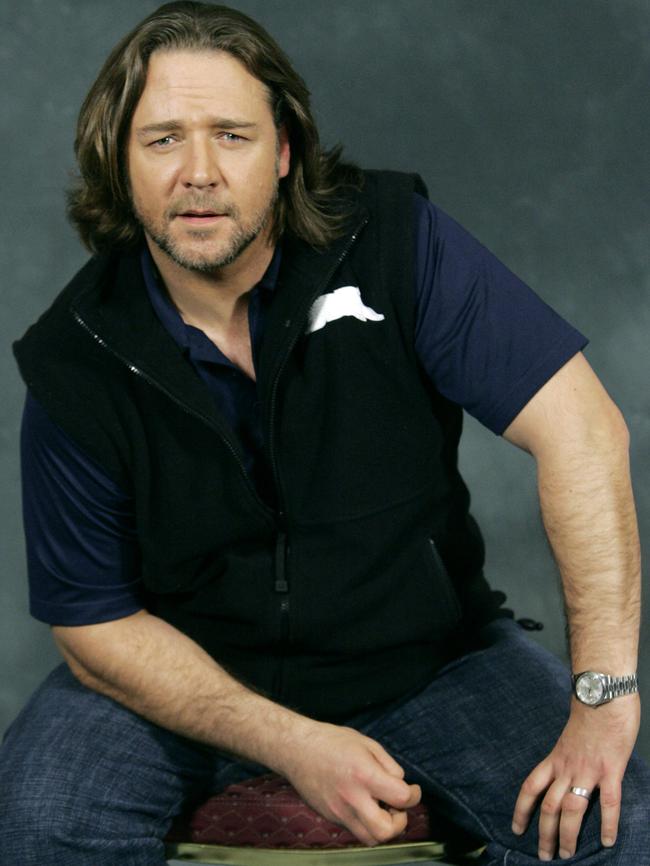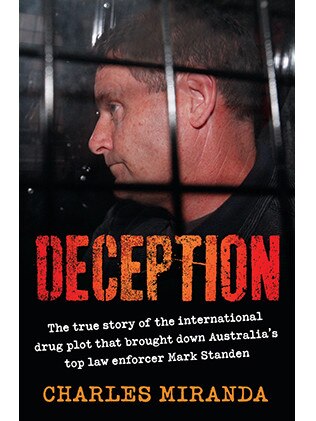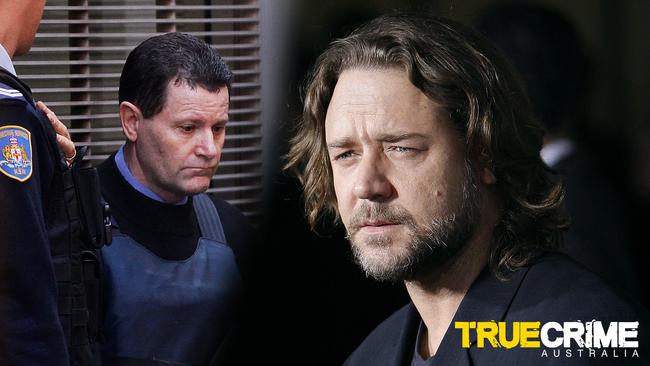TEN years ago last month, one of Australia’s most senior crime fighters, Mark Standen, was arrested for being the secret facilitator of a synthetic drugs cartel following the most sensitive and convert police operation in law enforcement history.
Never before had police been forced to arrest one of their own of such a high rank.

Given his reach to police operations overseas, including the FBI, the Australian Federal Police had to go to extraordinary lengths to make their case, including a huge transnational surveillance operation involving dozens of officers in six countries.
Finally in a basement in Sydney in June 2008 the Assistant Director of the NSW Crime Commission was arrested and charged over a plot to smuggle ecstasy-making precursor chemicals into Australia.
He was sentenced to 22 years jail.
News Corp Australia was granted exclusive access inside the police operation for almost two years and were attached to undercover operations in the Netherlands, including when agents posed as advanced security detail for the then travelling Socceroos squad.
They came across all sorts of characters who police had given codenames to, such as Mr Suit and Mr Blue, but then they overheard Standen refer to a Mr Russell Crowe.
BOOK EXTRACT: Shortly before Christmas 2006, Australian Federal Police senior managers receive a call.
It is urgent, it is serious, and suddenly it all makes sense.
“You’ve gort a beeg problem,” is how the heavily accented senior Dutch agent begins the brief conversation with an AFP agent in The Hague. The call is eventually passed to AFP Assistant Commissioner Tim Morris — and he is stunned.
In policing terms, the news is about as serious as it gets. It makes his blood run cold. A mole? A high-level mole in Australian law enforcement? It surely couldn’t be.
Morris immediately calls a counterpart in Holland.
His Dutch contact is more blunt than usual, and says they have come across intelligence, from extensive wire taps, that one of the largest criminal syndicates in Holland is being helped by a corrupt cop in Australia. A “crooked hat” is how he labels the suspected bent copper.
Specifically, Morris is told, the crooked hat is helping “fix the problems” of a syndicate, dubbed Reservoir Dogs, led by a Dutch businessman and international poker player, and a small consortium of his friends, including a former world-champion martial arts fighter and sports trainer.
The implications are huge on many levels. It will be many months later before the AFP identifies NSW Crime Commissioner assistant director Mark Standen as the “crooked hat” and expose a plot to import enough of the drug precursor pseudoephedrine to make $120 million in ice in a case that extends from rebels in the Congo and street gangs in Pakistan to criminals from across Australia and Europe.
CODENAMES
It’s May 2007, and about a dozen electronic communication intercepts are in place on various phones and faxes. Three months later, listening devices are installed in homes and even mobile phone handsets. Putting a bug in Standen’s phone is of course risky, given that he knows what to look for, but is critical to investigators.
However, surveillance teams trailing Standen are becoming increasingly frustrated by the number of codenames everyone seems to be using. The audio on the listening devices and telephone intercepts is often either faint or in many cases inaudible, making it hard to follow. Part of the reason is that the bug placed in Standen’s mobile phone is designed not just to pick up calls, but all ambient noise when the handset is not in use.
So the voices during face-to-face meetings are sometimes hard to hear over the clatter of cups and saucers, other voices, a background radio or traffic, or even the rub of the phone in Standen’s pocket while he is walking to meet someone.
On one occasion the teams question the quality of their tap when Standen apparently arranges a private meeting with someone called Russell Crowe. They think they have misheard, until they hear the name a second time.
Sensing a possible codename, they would eagerly wait outside an apartment in upmarket Walsh Bay on Sydney Harbour, curious to see what new character is about to enter the plot.
They are then astounded when the Oscar-winning actor swaggers down the road and shakes hands with their quarry.
CROWE CONTACT

Shortly after filming American Gangster and 3:10 to Yuma, Crowe was researching another potential film role and needed law-enforcement advice. Crowe had just finished touring the world promoting 3:10 to Yuma and had time on his hands to research a film about large-scale international drug operations.
“He (Standen) was given to me as a (former) federal police contact that was, I think he was described as straight as a die, honest as the day is long, never steer you wrong, someone to talk to in terms of your ongoing research to a certain project, you know,” Crowe said later of his meeting with Standen.
At the time he could not have imagined he was being monitored by an undercover AFP surveillance team, engaged in one of the most sensitive briefs in Australian law enforcement history.
“I had a very strange situation with him that came up. The day I was to meet him, I met him at Walsh Bay at those new apartments. I was actually doing something with the Sydney Theatre Company and they’ve got a little cafe there and so I met him out on the street, and we were walking down the alleyway between these buildings and there were these guys dressed as workmen, but there wasn’t like a building site anywhere.
“And they sort of turned and came towards us, and if they wanted they could have very easily stopped us in that alleyway. There was quite a large group of them, and one of them looked at me and kind of nodded his head and said ‘Hey Crowey, how are ya mate?’ ‘Ahh yeah, good mate,’ I said. And then they stepped aside and allowed the two of us to pass.
“We walked a few steps — I had only just met the bloke, and I hadn’t even spoken to him on the phone — I had literally met him thirty seconds before, and I said to him, ‘F... that felt like a hit’, and he said, ‘It did, didn’t it’. I just thought, what the f... was all that about?”
After news of Standen’s arrest Crowe still did not know what the incident was about, but described his moment — or perhaps Standen’s predicament, or both — as “not a good situation”.
“We go into these things, as you well know, with a certain level of inquisitive naivety, you know, and you can only take on the surface what you are told. I was very surprised, considering I had only ever heard of him in the context of him being a good guy.
“I rang the guy that put me onto him and said, ‘Geez, you are a f...ing good judge of character, sunshine.’ He just brought a sort of strange, eclectic group of people towards me that I could have conversations with, that could have been negatively affected by certain things, or what-have-you, and he was sort of a principal contact.
“I never saw him (Standen) again (after one meeting), it was only for about 20 minutes.”
DIRE STRAITS
The operations of the Reservoir Dogs are essentially compartmentalised, with not everyone in the scheme knowing who else is involved in the different aspects of the plot. Only their leaders, including the principals, know all the players.
As police listen in to listening devices placed inside Standen’s mobile phone and elsewhere they wonder what would drive a high-paid Australian cop to work with one of the Europe’s biggest drug cartels. They then pick up one recording and one motive emerges. “I’m in worse than dire straits,” Standen tells an accomplice. “I emptied my bank this morning so that they couldn’t take it out in fees, all right, I’ve spent $5 already, I have $85 exact to my name and an empty pantry, empty but not empty — but close to empty. My kids, they’re going ‘Dad, why aren’t you shopping, why haven’t you got a shop done?’

“I said, ‘Oh, I’ll do a shop soon’.
“My daughter this morning wanted to make — before I went to work, she was going to school — she wanted to make a chocolate. I normally have Milo right, no Milo, nothing. She was making me a chocolate drink out of my son’s army-ration powdered chocolate because he went to the Army Reserve — he had a container of like army stuff like, um, condensed milk and things. She’s looking through the pantry for something to make, she’s looking to make something and found an army ration pack — powdered chocolate in an army bag — making herself a drink of that. She said, ‘Dad, when are you going to do a shop?’ I always shop, I do the shopping.
“She said, ‘When are you going to shop?’ I said ‘Ah’. Out of food in the cupboards and the fridge and I can’t even do a shop. I’ve got $85 till next Tuesday night.”
For a split second, AFP agents feel sorry for him. But then they think what will happen if he successfully manages to get the precursors into the country and how many lives will be ruined.
• This is an edited extract from Deception: The true story of the international drug plot that brought down Australia’s top law enforcer Mark Standen
Allen & Unwin, RRP $22.99.
• This extract was previously published by News Corp Australia in May 2012


‘Shrapnel and faeces’: Shock of Bali bombing victims
A new book has revealed what happened inside the walls of the burns clinic treating Aussies injured in the Bali bombings. Read the extract.
My coffee date with two gangland killers
In his book extract, Enzo Condello — the brother of slain gangland figure Mario Condello — describes the day he saw the dark side of Carl Williams.